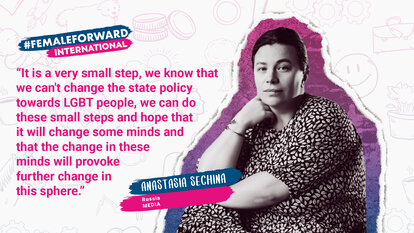#FemaleFowardInternational
On the importance of keeping regional journalism alive
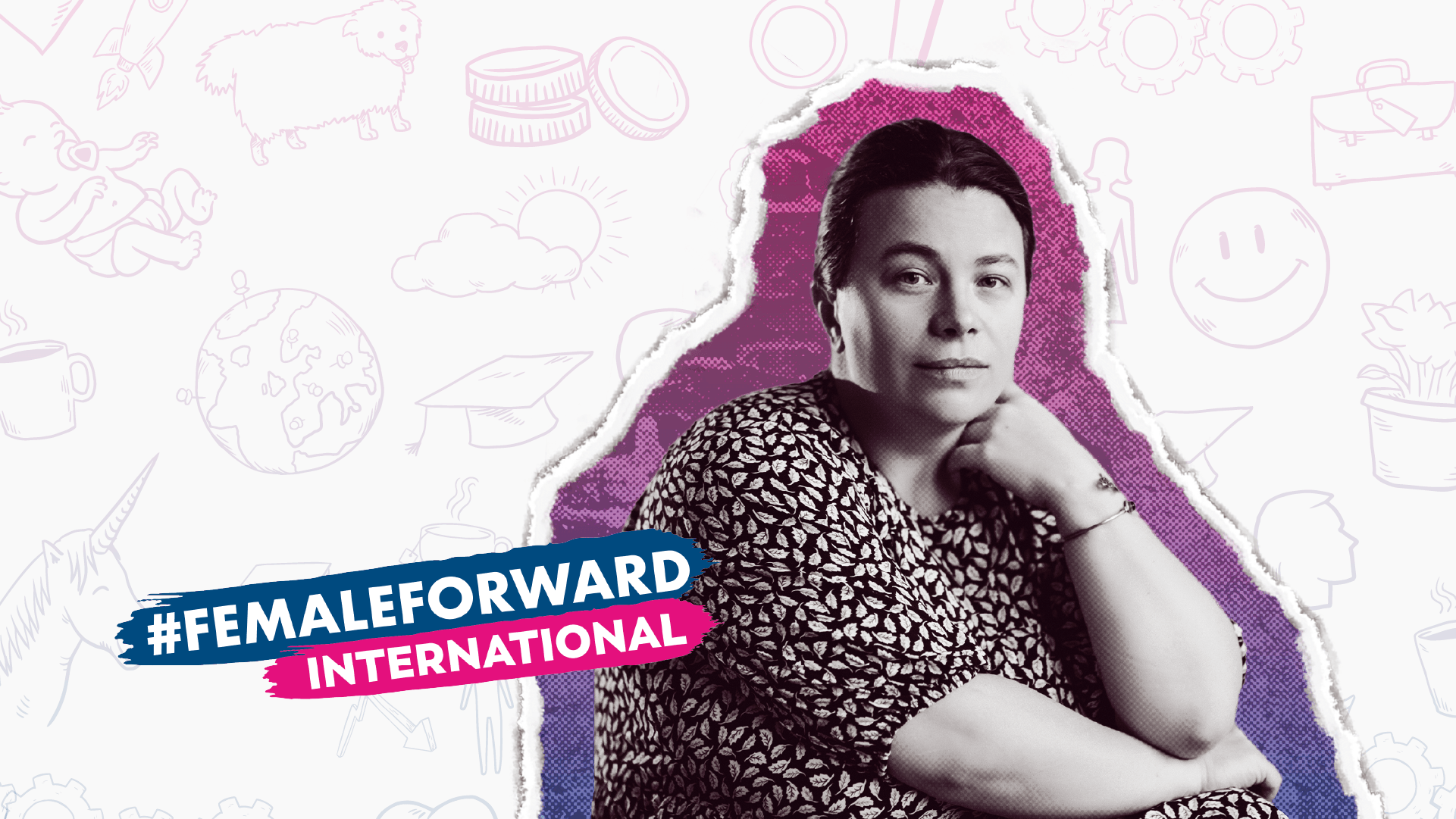
Update (December 2021)
Following the publication of this article in March 2021, the organization lead by Anastasia Sechina – “The Fourth Sector” came under the intense scrutiny of the Russian state apparatus and, in the end, decided to cease its operations. In July 2021, the Ministry of Justice launched an unscheduled inspection of the organization and in August labelled it a “foreign agent” – something Sechina herself predicted in the interview for this piece. According to her, the Justice Ministry claimed that “The Fourth Sector” had received money from foreign organizations and had engaged in political activity because in some of its publications, journalists had expressed criticism of actions by the law enforcement agencies and the penal system. Furthermore, the authorities claimed, some of its publications promoted “tolerance of LGBT people”, an action "contradicting state policy". Lastly, they claimed "The Fourth Sector" organized a rally in support of the persecution of fellow journalists – Ivan Golunov and Ivan Safronov, when in fact they had initiated these actions in their personal capacity, as citizens and fellow journalists, and not on behalf of "The Fourth Sector" itself.
“After our organization was recognized as a foreign agent, we decided to close it for several reasons. The status made cooperation with our organization unsafe; everyone who worked with us would be at risk of being recognized as individual foreign agent. We are a small initiative and do not have the resources to afford the administrative costs that bearing this status implies. And we risk a large fine because we did not voluntarily register as a foreign NGOs,” Sechina says. Despite the formal closure of “The Fourth Sector,” Sechina insists that the journalists who worked as part of it would continue cooperating, one way or another, despite the continued risk associated with this. “We released a sequel to the "Accusatory Clones" project, which talks about how the presumption of guilt works in Russia and why a political motive is not necessary to imprison an innocent person. We have released a large research project on humanitarian forensics, in which we research how this expertise helps to imprison and fine people for words and pictures,” the editor of “The Fourth Sector” adds.
Editor Anastasia Sechina speaks about the meaning and difficulties of being an independent journalist in Russia
It is a well-known fact that it is not easy working as a journalist in Russia. With laws regulating media and freedom of expression that are described as “draconian” by the Reporters Without Borders media watchdog, the country ranks 149th in the organizations’ latest World Press Freedom Index. “Journalists work in an environment of fear, maintained by physical and verbal violence, imprisonment, censorship, economic and political pressure,” concluded Friedrich Naumann Foundation for Freedom’s own Freedom Barometer. So how does an independent reporter survive in that environment? Especially when they are a woman and are not based in Moscow, where – limited as it is – support from international organizations and famous colleagues can mitigate some of the worst excesses of the authorities.
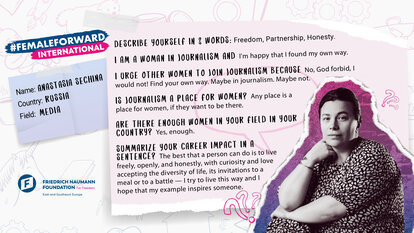
Anastasia Sechina has an answer. For almost 20 years she has been fighting – and surviving – in the inhospitable Russian media tundra from her hometown of Perm, deep in the Federation’s heartland. Currently, she is coordinating an independent journalistic project, the award-winning “The Fourth Sector” media collective, as well as the platform for journalist tools “Gribnitsa” (“Mycelium” in Russian) that aims to spread much-needed knowledge among reporters from local media that hardly ever get access to such things. What motivates her to endure this uphill battle? “Federal media does not care about our regional and local issues, and if there aren’t strong local media projects, who will talk about all of these problems? I don't know,” she says.
The start of a journey
She did not take that difficult road entirely on her own accord. Actually, before 2016 she had spent 14 pretty successful years as a radio host, editor-in-chief and, finally – programme director of the “Echo of Perm”, a regional partner of the “Ekho Moskvy” (Echo of Moscow) radio station, one of the oldest and most respected broadcasters in Russia at the time. Yet, this abruptly came to an end with the purchase of the station by a businessman who wanted to run for office in the State Duma. “He started to use the station for his own political purposes, so we tried to resist him, but it was not successful. Then the new management of the station made it clear — you either do the things that we want, or you go. And I left the station, with most of the journalistic team as well,” Sechina recalls.
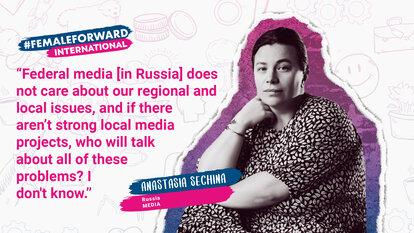
This felt like an end of an era. Fourteen years earlier, Anastasia Sechina, fresh out of high school, wanted to travel a lot and thought that a reporter’s profession would allow her to do just that. “I tried to apply to the Faculty of Journalism in Moscow, but I was not successful, and I returned to Perm, my native town, and I wanted to get a job as a cloakroom attendant in a school,” she says. Then, in a turn of events, a friend of her mother introduced her to the editor of the local radio and broadcasting company, who asked her if she had ever written anything – poems, stories – that he could read. “He then said [my writings] were a bit naive, but there was something in them, and that they would take me as an intern,” Sechina laughs. The senior journalist she got assigned to was pretty straightforward with her, saying that he didn’t have time for interns and he would throw her into deep water. “You will either swim out, or you won’t – and we will be very sorry,” he said. A week later – on her 17th birthday – Sechina swam out and got the job. Just a few years later, after a couple of brief stints at the local broadcaster and at local newspapers, she was entrusted (even to her own surprise) with the editor-in-chief position in “Echo Moskvy’s” Perm branch.
After the shock that came from her sudden parting with the broadcaster, a whirlwind of events ensued for her. “It was unexpected for me, but I won a grant for investigative journalism, and then one human rights activist offered me the chance to lead an investigative journalism project. And in the autumn of 2017, we founded “The Fourth Sector'' project. Some texts were picked up and published by [the internationally renowned independent media] “Meduza,” Sechina says. Two of the signature stories produced by Sechina’s team that were featured by “Meduza” were on the refusal of the federal government to pay compensations to the families of dead soldiers and on the impunity enjoyed by people committing homophobic crimes in Russia.
“The Fourth Sector” is now publishing not only investigative pieces, but all sorts of interregional and cross-subject stories that bring reporters from across Russia together. And Sechina is there to make sure it all works out. “As for me, I am less of a journalist and more an organizer of journalistic processes. Coordinator, editor, and a person who creates a breeding ground for my colleagues.”
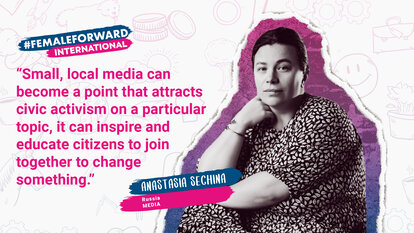
Keeping on pushing
What keeps her going despite all these difficulties is that, as a regional journalist in Russia, one still has the opportunity to affect outcomes in local cases of injustice or arbitrariness. “Small, local media can become a point that attracts civic activism on a particular topic, it can inspire and educate citizens to join together to change something. In small places, its influence is real,” Sechina says. “Here, in Russia, you can't influence more than that. Only on this local, regional level – and only partially,” she concludes.
Then, on the less negative side, she says she never felt special forms of pressure because of her gender. “I think there are some problems, but they are common to everyone in the world – it is not something unique about women-journalists in Russia. For example, when it comes to promotions, employers will chose men, because they won't give birth to children and won't need maternity leave,” Sechina says, adding that the low salaries in the profession are also taking a toll. Yet, she is reluctant to make generalizations – Russia is a big country and the situation in Voronezh and that in Chechnya and Ingushetia, for example, are entirely different.
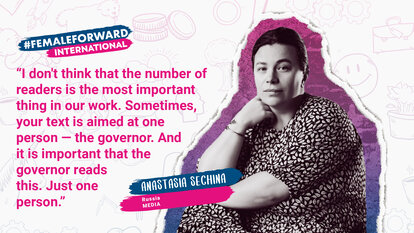
Crashing into walls
The problems for reporters start when they raise the stakes of their work. “When you start to talk about some systematic problem, a problematic project that the authorities try to implement, or about the dealings of a very important person, it is like trying to move a wall,” Sechina claims. She recalls the case of the investigation into alleged illicit property deals carried out by Russian Prime Minister Dimitry Medvedev, which caused huge public uproar and no repercussions – at least not for Medvedev himself. Ivan Zhdanov, the journalist and head of opposition leader Alexei Navalny’s anti-corruption group, was indicted by the State Prosecution for refusing to take down the video of the investigation into this property scandal. His situation is not unique.
“Being a journalist in Russia is difficult primarily because of our laws. I am talking about the law on fake news, the so-called ban on the propaganda of non-traditional sexual orientation, the law about foreign media agents, and the law on justification of terrorism and various others,” lists Sechina. “These laws are written in such way that if they want, they can convict you, they will find a reason if they really want to. There are no clear criteria and the application is selective.”
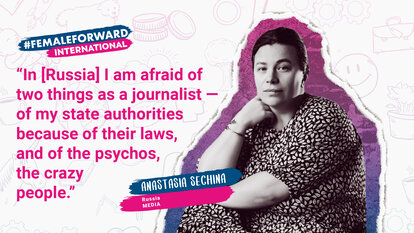
That is why when she and her colleagues start working on touchy subjects, they know what can come out of this. “We all understand that, at one moment, one of us could be charged under an article of one of these laws and you don't know who it will be. This is our reality now and there are not any methods to minimize these risks. There are none, apart from stopping to be a journalist and, in this way, you are safe. If you continue your journalistic activities and you deal with complicated topics, you are running these risks.”
Help is rarely on the way as well. For example, when Sechina and her team were pressured by the then new owner of the local branch of “Ekho Moscvy,” they did not receive much support from other media or watchdogs. “If you can draw attention to your situation and people from these big organizations and media say that it is really a serious situation and start a campaign, you have a chance. But if you can't draw attention to your situation... if you are from small, local media, what will you do?,” she asks rhetorically. To her, the number of people who have visited an article’s web page isn’t the most important thing. ‘“I don't think that the number of readers is the most important thing in our work. Sometimes, your text is aimed at one person – the governor. And it is important that the governor reads this. Just one person,” she claims.
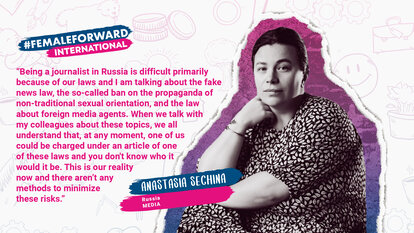
Fighting hate and finding purpose
The authorities are not the only force of nature Sechina is scared of. “In my country I am afraid of two things as a journalist – my state authorities because of their laws, and of the psychos, the crazy people,” she says, giving examples of the readers’ backlash that followed the publication of one of a series of articles on the lives of LGBT people, part of the “We Accept” project done in cooperation with Friedrich Naumann Foundation for Freedom. “It was bullying,” Sechina remembers. “I know that my name is used by this haters' community, they also mention it often, and write that I am an LGBT-loving person. And I think it is a risk… if I meet one of these people in a dark street and they recognize me… this is a risk that we take.”
At the same time, the journalist is also very well aware that only by bringing these topics up they can sow the seeds of change. “We created “We Accept” as a project about LGBT people who decided to come out, and of parents of LGBT people accepting their children, and hoped a parental community will start, as in Kyrgyzstan, and they can then help campaigns on LGBT rights later. It is a very small step, we know that we can't change the state policy towards LGBT people, we can do these small steps and hope that it will change some minds and that the change in these minds will provoke further change in this sphere.” Sechina says that “We Accept” actually had impact beyond simply telling a story – it led to the creation of a support group of parents of LGBT people in Perm, which actively supports its members and their children. What else can a journalist ask for from their work?
Follow more stories on female empowerment with #FemaleForwardInternational and in our Special Focus on the website.
